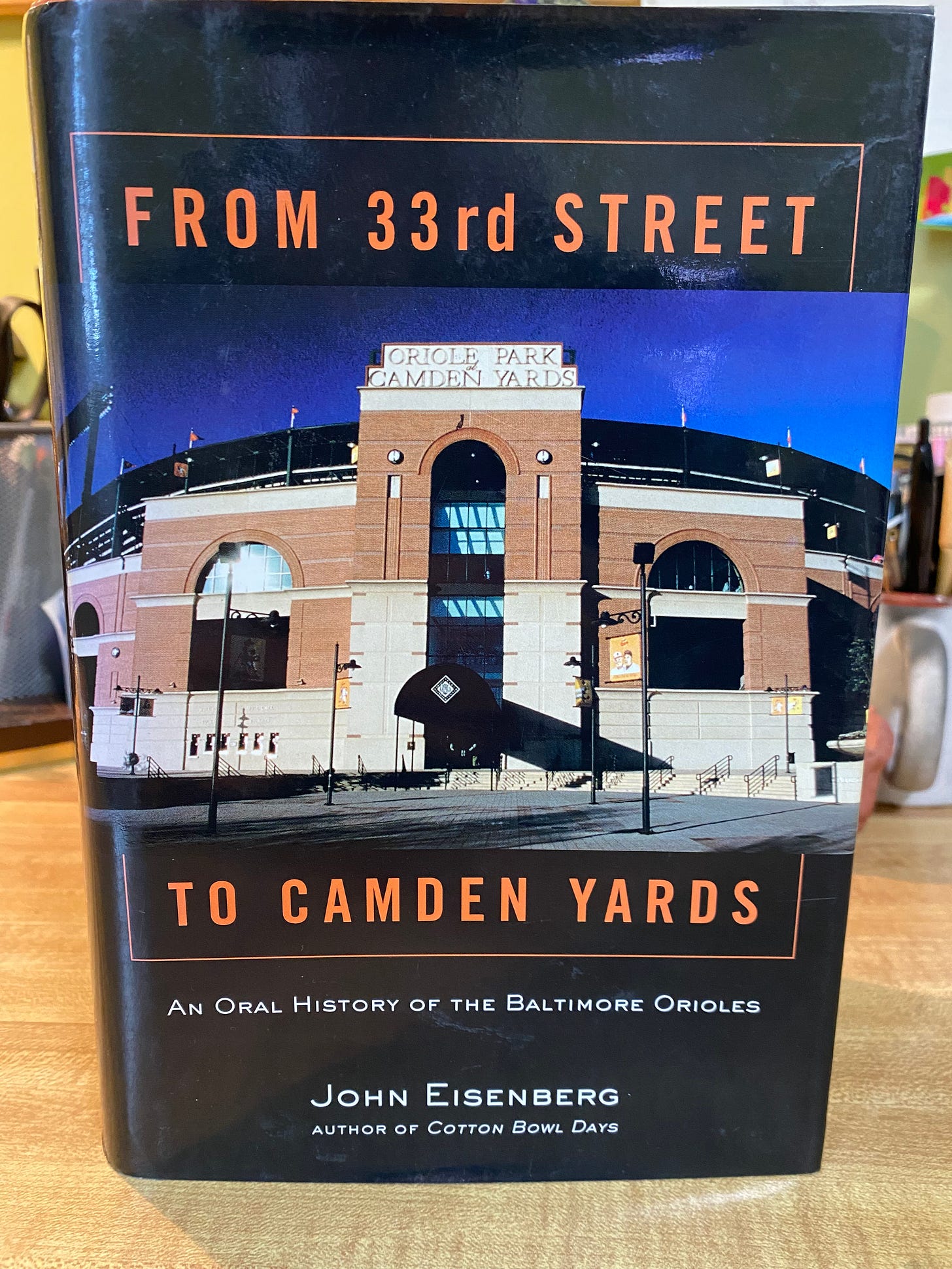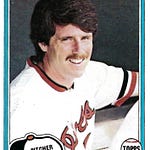When I published my oral history of the Orioles a quarter century ago, I did so without interviewing any of the sportswriters who’d covered the team through the decades. In hindsight, that was a mistake.
Oh, I know why I didn’t include my fellow residents of the press box. Between the nearly 100 interviews I did conduct with former players, executives, managers, scouts and broadcasters, I had enough material to tell the story of the Orioles’ first four-plus decades. More than enough material, actually. As it was, the book was nearly 500 pages and the audio version checks in at over 19 hours! If I’d added much more material from anyone back in the day, From 33rd Street to Camden Yards would’ve resembled Tolstoy’s War and Peace in size.
Fortunately, with the Bird Tapes, my Orioles history project on Substack, I’m getting a second chance to tell the club’s story. One of my goals is to fill in some of the gaps that existed in my first attempt. Another of my goals is to deliver the best possible Oriole storytelling.
Interviewing the great newspaper beat writers who covered the Orioles over the years helps me achieve both of those goals.
They were boots-on-the ground eyewitnesses paid for their powers of observation, their knowledge of the club, their ability to glean insights from events and their ability to put those insights and events in context with great writing.
And of course, they were and still are great storytellers.
In the coming months, I’m going to publish a series of podcast interviews with former Oriole beat writers. These interviews will be available to all Bird Tapes subscribers, both free and paid, because I want as many people as possible to hear this unique thread of Oriole storytelling, which certainly isn’t available anywhere else.
I’m starting the series with an interview with Richard Justice, who covered the Orioles for six seasons in the ‘80s for the Baltimore Sun and Washington Post. You may have seen him over the years on ESPN’s Pardon the Interruption, where his former Post colleagues Tony Kornheiser and Michael Wilson frequently had him on as a guest because they respected his insights on numerous subjects, including baseball.
Full disclosure, Richard and I go back. Like, way back to the first years of our journalism careers. We’re both native Texans and we landed together at the Dallas Times Herald, an afternoon daily (sadly, long gone), in the late ‘70s. I followed him on the high school beat, covering the famed Friday Night Lights — one of the best jobs I ever had. I followed him on the SMU football beat in the Pony Express era that ultimately led to the program’s demise. I followed him on the Dallas Mavericks beat, covering pro basketball. When he came to Baltimore to cover the Orioles for the Sun in 1984, I followed within a year. We finally broke up when he moved to the Post to cover the Orioles in 1986. I stayed in Baltimore and wound up writing columns.
Over the years, Richard also worked at such papers as the Chicago Sun-Times, Houston Chronicle and Fort Worth Star-Telegram, working such premier beats as basketball’s Chicago Bulls and football’s Washington Redskins. As I did, he worked in a golden era for newspaper sportswriting, when papers didn’t think twice about sending reporters and columnists to cover teams, events and stories. Richard did a million great things during his career but was never better than when he was working a beat, blending great writing, dogged reporting and the ability to quietly work a locker room for sources and information.
As he relates at the start of our conversation, he came to Baltimore right after the Orioles’ World Series victory in 1983, thinking he’d witnesss the continuation of their dynasty, which dated back to the ‘60s. But his timing was, if anything, momentous. Forty-two years later, the Orioles still haven’t been back to the World Series. Richard covered the collapse of the dynasty, not its continuation.
He was on the beat for six seasons, through 1989. It was a tumultuous time. Fans in Baltimore lost sleep over fears that the Orioles might follow the football Colts out of town, with owner Edward Bennett Williams moving them to Washington. Richard, who knew Williams well, suggests the attorney may well have bought the club in 1979 with such a move in mind, but that he changed his mind once he understood the strength of the bond between Baltimore and its baseball team.
It’s hard to remember now, but the level of concern and sensitivity in Baltimore was so heightened that some members of the Orioles’ front office were upset with Richard for moving to the Post, as if his career move — a call-up to the major leagues, by any reckoning — somehow foretold the Orioles’ departure.
While on the beat, Richard covered the Orioles’ trip to Japan after the 1984 season, the collapse of Eddie Murray’s relationship with the club and the organizational decline that peaked with the season-opening 21-game losing streak in 1988. But he also witnessed the magical 1989 season, when the Frank Robinson-managed Orioles almost pulled off a worst-to-first miracle. And he wrote about the complex political machinations that led to a deal for a new ballpark at Camden Yards, ending the speculation about the club possibly moving.
To repeat, I’m making this podcast available to all subscribers, free as well as paid. You can download it to a device and/ or listen on Apple Podcasts or Spotify. And I’m biased, but I’d recommend checking it out. Richard explains as well as anyone what made the Orioles great and then not so great. And like the great journalist he is, he understood during his time on the beat that he also was covering a city, and my two cents, his take on Baltimore at the end of the interview is priceless.
I’ll put out more interviews with beat writers in the coming months. Meanwhile, I’ll continue to add new interviews with former Oriole players and club officials, as I’ve done all along. (Spoiler alert, my recent conversations with Scott McGregor, Janet Marie Smith, Bobby Grich and Mike Boddicker are among those coming soon.)
If you want to support the mission of the Bird Tapes with a paid subscription, click on the “subscribe now” button and know that your support is appreciated.
Here’s a guide to what Richard discusses in the interview:
He began covering the Orioles for the Baltimore Sun in the spring of 1984 when the football Colts left for Indianapolis. He thought he was coming in to write about baseball royalty, which the Orioles had been since the ‘60s, but the farm system had dried up and he wound up covering a precipitous decline. Washington attorney Edward Bennett Williams, who owned the team, wasn’t suited to owing a baseball team because he was impatient and wanted more action. The Orioles’ decline deeply impacted Eddie Murray, Richard says, because he believed in the core values of the Oriole Way, which had disappeared. The wave of free agent signings in 1985, orchestrated by Williams, destroyed the atmosphere around the team.
Richards recalls the Orioles’ trip to Japan after the 1984 season. The players fell in love with the country but it was an exhausting trip. Richard recalls Williams admiring a new stadium at one of the stops in Japan and suggesting Baltimore could do the same for the Orioles. There was no way Williams and William Donald Schaefer, the governor of Maryland in the ‘80s and a former Baltimore mayor, weren’t going to get a deal done for a new ballpark.
Murray’s attitude soured as the Orioles began to lose. Richard had gotten along well with him until then, but he became difficult, and not just for the reporters covering the team, but also for his teammates. According to Richards, Eddie didn’t like Lee Lacy or Fred Lynn. Alan Wiggins, one of the free agent signings, was a good guy with a terrible drug problem, Richard says.
It became clear that the farm system was drying up when pitcher John Habyan and outfielders John Shelby and Mike Young didn’t become stars. Don Baylor told Richard that Earl Weaver wasn’t the same when he came out of retirement to manage the Orioles in 1985 and 1986. One night in 1986, Weaver held up a lineup card and told Richard it was the worst team he’d ever put on a field. Baylor said it hurt to watch Earl fail and suffer.
Richard wonders what might have happened if Williams hadn’t fired GM Hank Peters in 1987. Peters became the GM in Cleveland and built the then-Indians into a winner. Williams was just too impatient. Richard speculates that Williams may well have wanted to move the club to Washington in the beginning but fell in love with Baltimore. In the late ‘70s and early ‘80s, The Orioles were an exception to the rule that payroll dictated standings.
Richard recalls Frank Robinson, who managed the team from 1988 until his firing in 1991. Frank never managed a player as good as he was, but he came to understand that other players just weren’t as good. Richard recalls him crying after the “Why Not?” Orioles were eliminated on the penultimate day of the 1989 season.
Baltimore is a great sports town, says Richard, who has also worked in Dallas, Chicago and Houston. Walking into Memorial Stadium, you couldn’t help but feel the history and couldn't help but love it. The Orioles had a hold on the city’s emotions.














Share this post